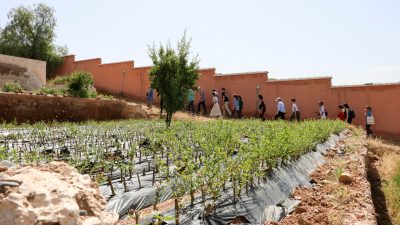Multiculturalism, In Morocco, Difference Is a Strength

Morocco’s belief in the strength of pluralism has energized me and shown me that difference can serve as a strength for any country, whether it is religious or secular, large or small, developed or developing.
I was told that there are spiritual answers to the question, “Why Morocco?”—every person has a story to explain why they are in this country. The hospitality, emphasis on community, and religious practice are only a few of the reasons Moroccans and visitors have provided. While personal narratives and my own experience have intertwined to affirm this point, so do the tenants of community and participatory development that I have witnessed as an intern at the High Atlas Foundation, a nonprofit dedicated to local initiatives that community beneficiaries determine and manage.
My first week in Morocco, after traveling toward the Amazigh village of Akrich, we stopped at a tree nursery. The seemingly small plot of pomegranate and fig saplings is the backdrop to a linkage of cultural cooperation. While Jewish pilgrims visit the mausoleum of Rabbi Raphael Hacohen year after year, a Muslim man, Abderrahim Beddah, serves as the caretaker of the land. This relationship helps the High Atlas Foundation engage a women’s cooperative in the neighboring village. Initiatives are interconnected.
Now these multicultural nurseries are receiving government support. The National Initiative for Human Development has provided land-assessments to monitor the viability of an organic fruit tree nursery near the mausoleum of Rabbi David-Ou-Moshe in the Ourzazate province. They will begin implementing a project that will generate more than one-million trees over five years.
Sustainable development was created through, and continues to depend on, interfaith partnerships. If Beddah did not share the story of Jews crying on the journey to visit their saint and express his deep appreciation for their faith, then this partnership would be unlikely. However, the investment Moroccans make when they support their neighbors is a testament to development that depends on pluralism.
This concept resurfaced in a new friendship. The Ministry in Charge of Moroccans Living Abroad and Migration Affairs – in cooperation with the Association of Friends of the Jewish Museum – fund to bring Jewish people with Moroccan heritage back to discover their roots, meet government and religious leaders, and encourage local investment.
The High Atlas Foundation interns were invited to attend a shabbat dinner during the program for these Moroccan-Jews, and it was at that dinner that my observations were confirmed. I met a woman who has grown up in France, but her parents were from Agadir, Morocco. This was the first time she traversed the site of her great-great-grandparents’ graves and engaged with her heritage. We got to talking about religious coexistence and respect. She put it quite simply—“in Morocco, Jews and Muslims are first Moroccan. They live well together because their identity is placed in the fact that they are neighbors.” She told me she believed that allegiance should be first to one’s country and then to religion, at least in how it is outwardly expressed. We both agreed that country needs to be respected…humanity needs to be respected.
Pluralism is a framework written into Morocco’s foundational documents. Development requires all parties, faiths, and populations of Morocco. I have seen this visiting a women’s cooperative where dialogue and decision making are priorities. I have seen this in visiting the grave of a venerated Jewish saint, guarded by a Muslim. I have seen this in the logistical processes that allow for the purchasing of carbon credits and maintenance of olive, walnut, and carob farms.
In 2008, King Mohammed VI announced a vision for Morocco in which “culture serves as a driving force for development as well as a bridge for dialogue.” Moroccans are stepping up to the plate, imagining and wrestling to manifest this vision. The country’s potential should serve as an example. But we must not forget that there are villages still plagued by diarrhea, girls not in school, and trees left uplanted. These examples remind us that although potential is not lacking, resources are forever necessary. Volunteers should never back down in fear of not doing enough. Passion for understanding others, learning a new language, or living immersed in a beautiful expression of religion should be motivation to bring you to Morocco. Finding or supporting organizations like the High Atlas Foundation is integral to this vision.
My spiritual explanation to “Why Morocco?” has come to rest in my hope for this pluralistic and collaborative future of development. Creating cooperatives, living together, and working toward a common goal or vision is very “Moroccan.” But it is also very “human.” I wonder how life would look if other countries began to call for pluralistic-driven development in their constitutions, laws, policies, and institutions?
*
Note to readers: please click the share buttons above or below. Forward this article to your email lists. Crosspost on your blog site, internet forums. etc.
Caroline Kirk is a third year student at the University of Virginia. She spent the summer of 2019 interning at the High Atlas Foundation, working on interfaith and multicultural initiatives.
Featured image is from HAF

